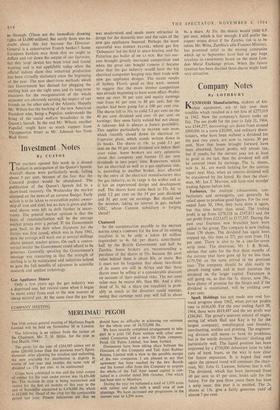Investment Notes
By CUSTOS.
Tulemarkets opened this week in a dismal fashion in anticipation of the Queen's Speech. Aircraft shares were particularly weak, falling about 5 per cent, because of the fear that the Concord project would be abandoned. The publication of the Queen's Speech led, to a shunt-lived recovery. On Wednesday the market slumped on the news of an autumn Budget. Early action is to be taken to re-establish public owner- ship of iron and steel, but no date is given and the steel shares were left to drift further in uncer- tainty. The general market opinion is that the basis of renationalisation will be the average market prices over a period. If the Government goes back to the date when Signposts for the Sixties was first issued, which was in June 1961, then the average will work out at several shillings above present market prices. On such a contro- versial matter the Government could afford to be generous. Generally speaking the Government's message was reassuring in that the strength of sterling is to be maintained and industries helped to gain the full benefits of advances in scientific research and applied technology.
Gas Appliance Shares Only a few years ago the gas industry was a depressed one, but revival came when it began to move away from coal to the new sources of cheap natural gas. At the same time the gas fire
was modernised and made more attractive in design for the domestic user and the sales of the new gas appliances boomed. Perhaps the most successful was SYDNEY FLAVEL, whose gas fire Debonaire' led the field in space heating, and the Potterton gas boiler of DE LA RUE. But this suc- cess brought greatly increased competition and when the great GEC bought CANNON it became clear that the gas industry would have the big electrical companies barging into their trade with new gas appliance designs. The recent results of Sydney Flavel. good as they were, seemed to suggest that the more intense competitiOn was already beginning to have some effect. Profits were up over 50 per cent and equity earnings rose from 61 per cent to 88 per cent, but the market had been going for a 100 per cent rise. The shares fell to 31s. to yield 5.2 per cent on the 40 per cent dividend and over 10 per cent on earnings; they seem fairly valued but not cheap. A takeover bid is always a future possibility. This applies particularly to GLOVER AND MAIN. which recently closed down its electrical re- frigerator plant, which stands written down in its books. The shares at 19s. to yield 5.1 per cent on the 10 per cent dividend are' below their asset value. Some brokers are very optimistic about this company and foresee 15 per cent dividends in two years' time. RADIATION, which has an electrical as well as a gas appliance side, is, according to another broker, least affected by the entry of the electrical manufacturers into the gas industry, as its range is the widest and as it has an experienced design and development staff. The shares have come back to 53s. 6d. to yield 5.2 per cent on the 14 per cent dividend and 8+ per cent on earnings. But should not the investor, taking an interest in gas, include GEC, whose Cannon subsidiary is forging ahead?
Chartered
So the compensation payable to the BRITISH SOUTH AFRICA COMPANY for the loss of its mining royalties is 'to be only a token £4 million (equivalent to- 4s. 6d. per share), contributed half by the British Government and half by Zambia. Some brokers are recommending a purchase of the shares at 51s. because the asset value behind them is about 80s. or more. But it must not be forgotten that about two-thirds of its assets are still in Africa and that these shares must be selling at a considerable discount on account of their political risks. The net asset value may be nearer 60s. than 80s. And a divi- dend of 3s. 6d. a share (ex royalties) is prob- ably as much as the directors could manage, seeing that earnings next year will fall to about
4s, a share. At 51s. the shares would yield 6.9 per cent, which is fair enough. I still prefer the copper mines direct if the Zambia risk is to be taken. Mr. Wina, Zambia's able Finance Minister, has promised relief to the mining companies which up to .September have had to pay huge_ royalties to CHARTERED based on the steep Lon- don Metal Exchange prices. When the future taxation has been decided these shares might look very attractive.
































 Previous page
Previous page